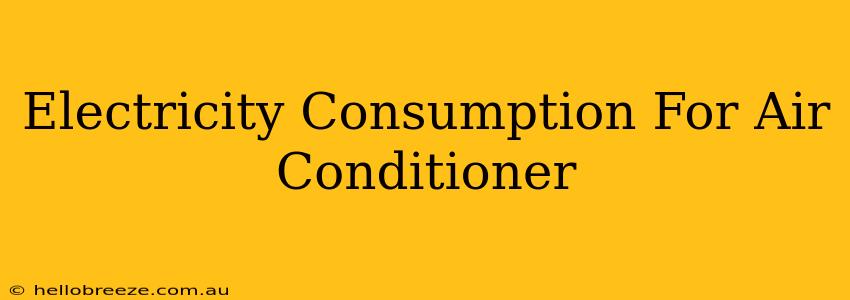Staying cool during those hot summer months is essential, but understanding your air conditioner's electricity consumption is equally important. High energy bills can be a unwelcome surprise, so let's delve into how much electricity your AC uses and how you can potentially reduce consumption.
Factors Affecting Air Conditioner Electricity Consumption
Several factors influence how much electricity your air conditioner consumes. Understanding these will help you make informed decisions about usage and potential upgrades.
1. AC Unit Size and Type:
- Size: An air conditioner that's too small for your space will work harder and consume more energy to cool the area effectively. Conversely, an oversized unit might cycle on and off frequently, also impacting efficiency. Proper sizing is crucial for optimal energy use.
- Type: Window units generally consume less energy than central air conditioning systems, but central AC systems offer more precise climate control throughout a larger area. Heat pumps offer significant energy savings compared to traditional AC units, but their effectiveness depends on your climate. Inverter AC units adjust their cooling power based on the room's temperature, resulting in better energy efficiency.
2. Energy Efficiency Rating (SEER):
The Seasonal Energy Efficiency Ratio (SEER) is a crucial metric. A higher SEER rating signifies a more energy-efficient unit. Older AC units have lower SEER ratings, often resulting in significantly higher energy consumption. Consider the SEER rating when purchasing a new air conditioner.
3. Usage Habits:
- Temperature Setting: Lowering the thermostat drastically increases energy consumption. Aim for a comfortable temperature, and consider raising it a few degrees when you're away from home or asleep. A programmable thermostat can automate these adjustments.
- Fan Speed: While using a higher fan speed might seem like it cools quicker, it doesn't necessarily increase cooling power; it just circulates air faster. Often, a medium fan speed is sufficient and more energy-efficient.
- Window & Door Sealing: Proper sealing minimizes air leaks, preventing cooled air from escaping and reducing the workload on your AC unit. This is a simple, cost-effective way to improve efficiency.
4. Maintenance:
Regular maintenance is vital for optimal performance and energy efficiency.
- Filter Cleaning: A clogged air filter restricts airflow, forcing the unit to work harder and consume more energy. Change or clean your filters regularly (at least every 3 months).
- Coil Cleaning: Dirty evaporator and condenser coils reduce efficiency. Professional cleaning or even careful DIY cleaning can make a big difference.
- Regular Servicing: Schedule annual professional servicing to ensure your unit is operating at peak efficiency and identify potential problems before they escalate.
Reducing Your Air Conditioner's Electricity Consumption
Here are some actionable steps to lower your energy bill:
1. Optimize Your Thermostat:
- Programmable Thermostat: Automate temperature adjustments to match your schedule.
- Smart Thermostat: Gain even more control through app-based adjustments and energy-saving features.
2. Improve Insulation and Sealing:
- Caulk and weather stripping: Seal gaps around windows and doors.
- Insulation: Proper insulation in walls and attics reduces heat transfer and lowers your cooling needs.
3. Utilize Natural Cooling:
- Fans: Circulating air can help you feel cooler, allowing you to raise the thermostat temperature.
- Shades and Curtains: Block direct sunlight to reduce heat entering your home.
4. Consider Energy-Efficient Upgrades:
- High-SEER Unit: Replacing an older unit with a high-SEER model can significantly reduce your energy consumption.
Conclusion: Making Informed Choices About Air Conditioning
Understanding your air conditioner's electricity consumption allows you to make informed decisions about usage and potential upgrades. By implementing these tips, you can significantly reduce your energy consumption and save money on your electricity bills while keeping cool and comfortable throughout the warmer months. Remember, a small change in habits can make a big difference in your energy efficiency.

